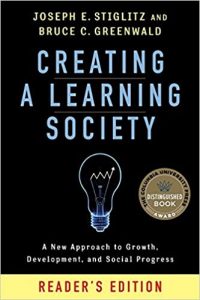I recently re-read Joseph Stiglitz and Bruce Greenwald’s (2014) Creating a Learning Society: A New Approach to Growth, Development and Social Progress (slightly amazed at how many years ago it was published, as I remember hearing Joe Stiglitz give a talk about it in Toulouse when it was just out. Seems much more recent in memory.)
It’s a masterly reframing of how to think about economic development and importantly appropriate policies in terms of quite simple models that are completely compatible with mainstream economics. The policy mix runs counter to what one could describe as conventional (mainstream) wisdom. The book advocates strategic industrial policy – because the models all involve hysteresis, so history matters and policymakers need to think about the path from here to the future; less extreme (albeit enfroced) IP rights because creating the incentive to innovate from a given pool of knowledge has to be traded off against a smaller pool of knowledge; trade/infant industry protection because learning by doing and learning from experience make production important to grow the pool of knowledge. The message about market structure – competition/concentration and static vs dynamic efficiency – is that it’s complicated. There’s no simple relationship.
Above all, when technology is endogenous there can be no presumption that market outcomes are efficient, and policies need to think about how firms and society learn, and not just about allocative efficiency. It’s a great book for students because it demonstrates how to use models to think about complex policy options, and also that it is not bad economics to challenge market first-ism. Although pitched at developing economies, I went back to it to think about the levelling up challenge within the UK economy. Knowledge sticks to people, who stick in places, and as it accumulates places can diverge a lot over time. Given that innovation also requires adequate scale and some means of mitigating the uninsurable risks associated with it, the need for significant policy interventions seems clear to me.

